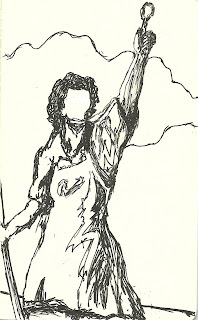'Chicken soup with barley' review or 'Waiter, there's a war in my soup.'
'Chicken Soup With Barley', Arnold Wesker
Royal Court Theatre, Tuesday 7th June 2011
Written for Culture Wars
At the start of Wesker's 'Chicken Soup With Barley', Jewish mum Sarah's communal cup overfloweth. It is 1936, the East End is united against Moseley's advancing fascists and Sarah can't move for friends under her feet and thirsty requests for tea. It is a time of togetherness, when everyone eats, debates and marches in unison. Ten years later and, in the aftermath of the war, Sarah's socialist ideals are being spurned by those she loves. Friends and family leave Friday night dinners early, angry and embarrassed. Ten years later still and, despite the Soviet army's vicious presence in Budpest, Sarah still fervently believes. Only, none of her friends – not even her son – will stay for tea any more. Tidy, isn't it?
Many will praise Wesker's use of a tight, family drama to explore seminal and often distant political movements. Indeed, on the 1958 premiere of 'Chicken Soup' at the Royal Court, Tynan enthused: 'Like many Jewish writers, [Wesker] think internationally, yet feels domestically; and it is this combination of attributes that enables him to bring gigantic events and ordinary people into the same sharp focus.'
And yet, these links between the political and personal aren't those skewed connections we find in Miller or even Shakespeare. Instead, it's as if a blue print of 'outdoors and beyond' has been carefully papered over Sarah Kahn's household. Sure, this allows for low-key chat that tingles with wider resonances and also imposes great significance on seemingly individual dramas. But this is theatre that's hard to get lost in. It's the type of show in which one can immediately identify quotable lines and nod, approvingly, at their zinging symmetry: 'Someone told her socialism was happiness, so she joined the party!'
A play as pointedly constructed as this, with so much relevance carefully ladled onto each character and his or her life choices, is bound to have some plum parts. And, indeed, the central role is a cracker. Samantha Spiro's extraordinarily restless Sarah Kahn is a magnetizing whirl of energy. She is a woman who so revels in keeping busy that one suspects, were she to stop moving she would drop dead instantly. She is a woman for whom everything is a race, every conversation a debate and every decision a statement about who or what you believe in.
Spiro's Sarah is as strong and capable as her husband, Harry, (Danny Webb) is limp and languorous. Sarah's volcanic force rubs raggedly against Harry's stagnant form, constantly on the verge of eruption. There is an extraordinary scene when, in the aftermath of the 1936 anti-fascist demonstrations, Sarah discovers Harry spent the afternoon drinking tea with his mother. Despairing of her husband's cowardly apathy, Sarah initially refuses to pick a fight with her husband. Dominic Cooke is brilliantly tuned to the pressure points in this play and he pitches this wordless fight perfectly. The aching silence which stretches out between this eye-rolling wife and eye's down husband expresses their irreconcilable differences even more starkly than the crackling confrontation that follows.
These marital meltdowns are something to savour but, as the relationship disintegrates and Harry's health deteriorates, the impact of this relationship fades. Sure, the absence of fight is notable but the energy their bristling banter creates is lost. Instead, Wesker turns to the relationships between Sarah and the next generation, whose political ideals have been seriously eroded over the years. Will Sarah's children, her son Ronnie in particular, make the same mistakes their parents did? Again, Weskey keeps things tidy and son Ronnie's decision to study as a chef, rather than pursue his passion for the arts, clangs with foreboding.
The suggestion of a repeat cycle, with the son imitating his father's mistakes, isn't just left to lurk in the shadows. Instead, this idea is bought into the spotlight when Ronnie (Tim Rosenthal) and Sarah fight, following the son's disillusioned return from Paris. Rosenthal, somewhat typecast following his successful turn as the cheeky brother in the sitcom 'Friday Night Dinner', comes a little undone by Wesker's script. He lacks the emotional texture of the more experienced actors and his role, along with the play, begins to feel brittle. The lines clang with convenience. When Ronnie warns his mother of his burgeoning apathy - 'The trouble is, I don't care either' – his words feel significant but, for all their relevance, strangely hollow.



Comments
Post a Comment